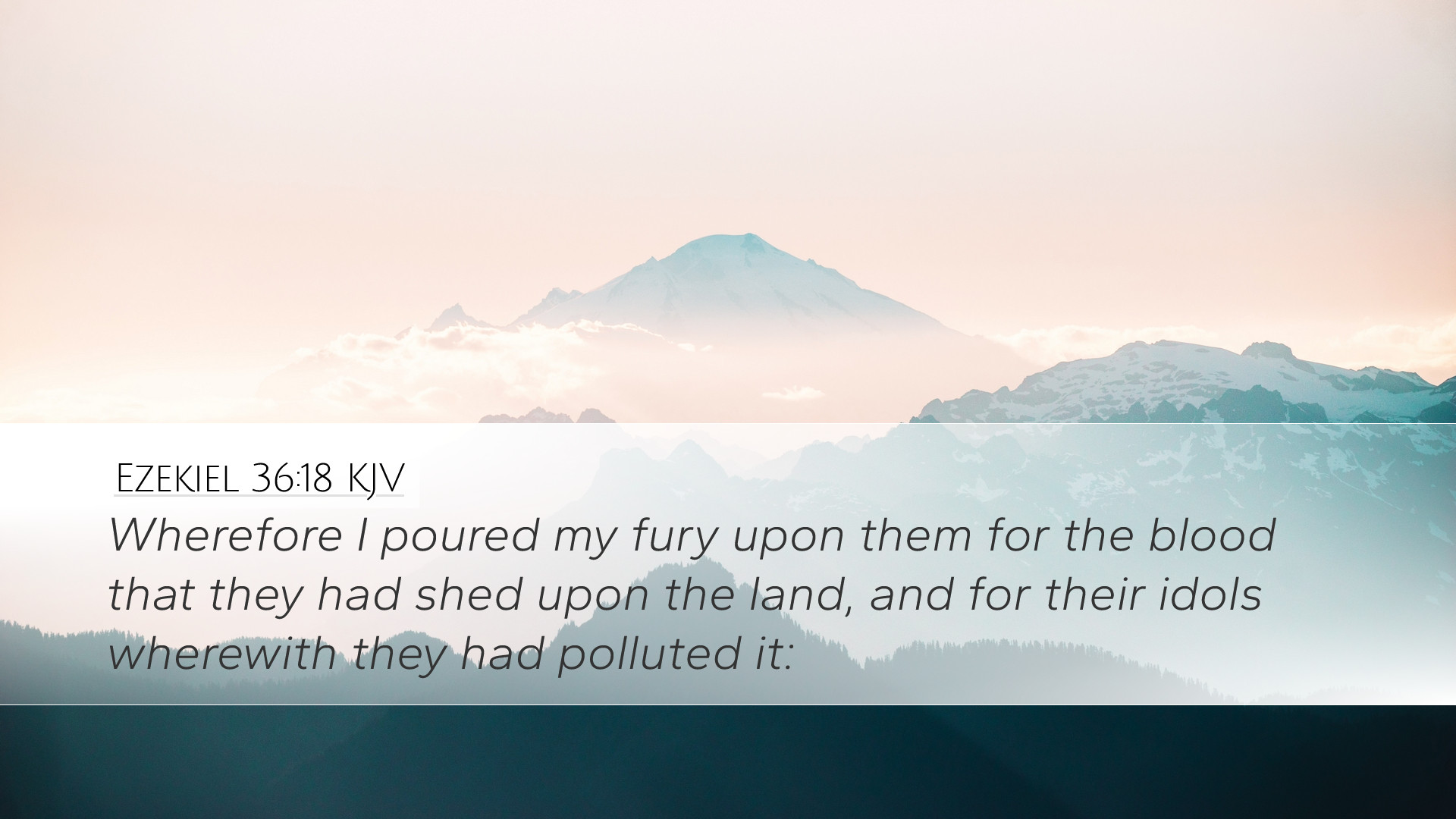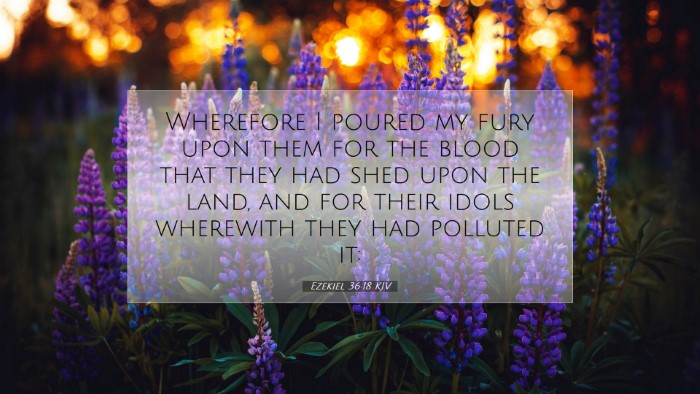Ezekiel 36:18 - A Commentary
Verse: "Therefore I poured out my fury upon them for the blood that they had shed upon the land, and for their idols wherewith they had polluted it." (Ezekiel 36:18, KJV)
Introduction
This verse occurs within a larger prophetic context where God, through the prophet Ezekiel, speaks concerning the judgment of Israel and the restoration that He promises to bring upon His people. The context here provides significant insight into God's character, His justice, and His merciful covenant promises. Public domain commentaries shed light on both the historical and theological significance of this verse, revealing how it applies to believers today.
Theological Insights
Commentaries from Matthew Henry, Albert Barnes, and Adam Clarke each provide pertinent insights into the complexities surrounding Ezekiel 36:18.
-
Matthew Henry:
Henry emphasizes God's righteous anger. The bloodshed mentioned reflects Israel's disobedience and the severe consequences that arise from violating God's law. He explains how this judgment is proportional to the wickedness of the people, highlighting the principle that sin incurs divine wrath. Additionally, Henry notes that the shedding of blood is profoundly serious in God's eyes, indicating a disruption of the covenantal relationship between God and His people.
-
Albert Barnes:
Barnes' commentary focuses on the pollution of the land through idolatry, which was a primary concern for God throughout Israel's history. He details how idolatry not only corrupts the individuals but also brings disaster upon the entire nation. Barnes interprets the "fury" of God as both a response to Israel's actions and as a necessary purification, leading toward the restoration promised in the subsequent verses. He stresses the transformative power of this judgment as a precursor to rehabilitation and renewal among the people.
-
Adam Clarke:
Clarke provides an intricate analysis of the term "fury," describing it as an expression of God's zeal for His holiness and for the welfare of His people. He expresses that God's anger is not arbitrary but is rather rooted in a desire for His people to turn back to Him. Clarke's perspective sheds light on God's longing for reconciliation, making it clear that while judgment is due, mercy is also at play, as God seeks to cleanse His people for restoration.
Historical Context
Understanding the historical backdrop of Ezekiel's prophecy is crucial for interpreting this passage. Ezekiel prophesied during the Babylonian captivity, a critical period when the Israelites faced intense suffering and loss. Public domain commentaries elaborate on how the exile served as a divine judgment for their persistent idolatry and rebellion against God.
Henry reflects on how Ezekiel's messages not only rebuked the nation for their past but also presented a future hope of restoration. In the face of their sin, God's fury leads to a necessary correction, ultimately ensuring that His holiness remains uncompromised.
Interpretative Approaches
Various layers of meaning can be derived from this verse, with each commentator offering a unique lens through which to view God's judgment and mercy.
-
Judgment and Restoration:
The dual themes of judgment and eventual restoration are prominent in Ezekiel 36:18. It is crucial for theologians and scholars to grapple with how God's fury serves both justice and purpose. The idea is that judgment may precede restoration, fulfilling a role in God's redemptive plan.
-
The Nature of Sin:
The text elucidates the seriousness of sin, particularly idolatry, which is tantamount to breaking covenant with God. This point is widely addressed in public domain commentaries, emphasizing the need for a deep examination of what it means to be unfaithful to God.
-
The Holiness of God:
Whenever God's judgment is mentioned, it is essential to correlate this with His holiness. The commentaries reveal that God's anger is a reflection of His purity and His demand for the same among His people.
Application for Today
The relevance of Ezekiel 36:18 extends beyond its historical context and beckons contemporary applications for believers and leaders in the church. The themes of accountability, divine wrath against sin, and hope for redemption resonate strongly. Several key applications can be noted:
-
Awareness of Sin:
Today, the church must remain vigilant against the subtle encroachments of idolatry within its midst. As Clarke notes, God’s desire for holiness calls His people to introspect and eliminate anything that could take His rightful place in their hearts.
-
Understanding Divine Wrath:
It is vital for pastors and theologians to articulate a balanced view of God's nature, one that includes His ability to express fury against injustice and disobedience, while also embodying mercy. Acquire understanding that God's wrath leads to the ultimate goal of restoration.
-
Hope in Restoration:
Finally, the promise of restoration found in the subsequent chapters of Ezekiel serves as a powerful testament to God’s faithfulness. While judgment is a reality, so is the hope of a renewed covenant relationship with God.
Conclusion
In Ezekiel 36:18, a profound narrative unfolds, revealing God's righteous anger toward sin and His overarching intention for redemption. The insights drawn from notable commentaries guide pastors, students, and scholars in understanding the multi-dimensional aspects of God's character as illustrated in this verse. Recognizing the seriousness of idolatry and sin, we are reminded that though judgment may visit, God’s mercy ultimately prevails, paving the way for restoration and new life for His people. The message of this scripture not only pertains to ancient Israel but also resonates in the hearts of today’s believers, calling them to a life of fidelity and reverence before their Holy God.


